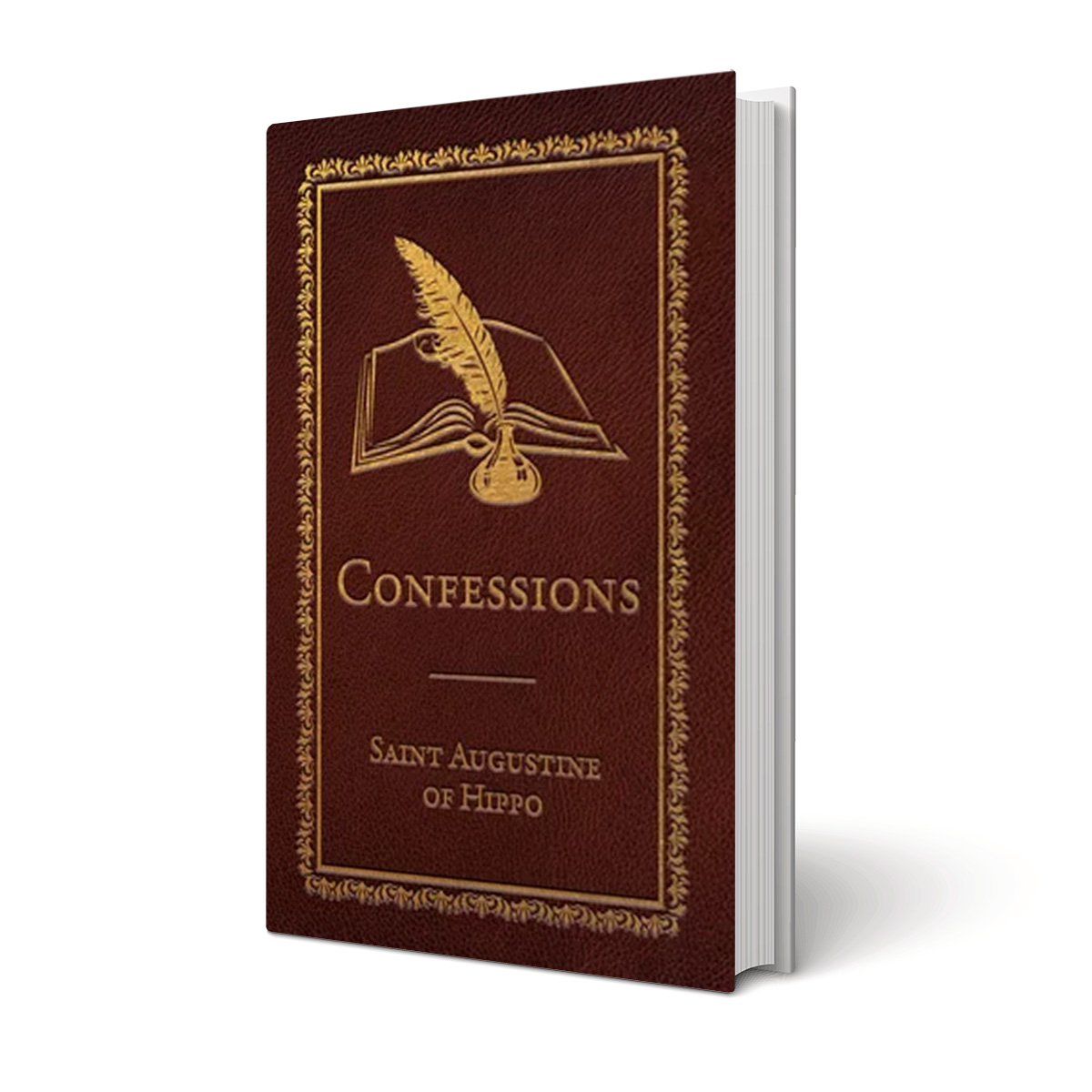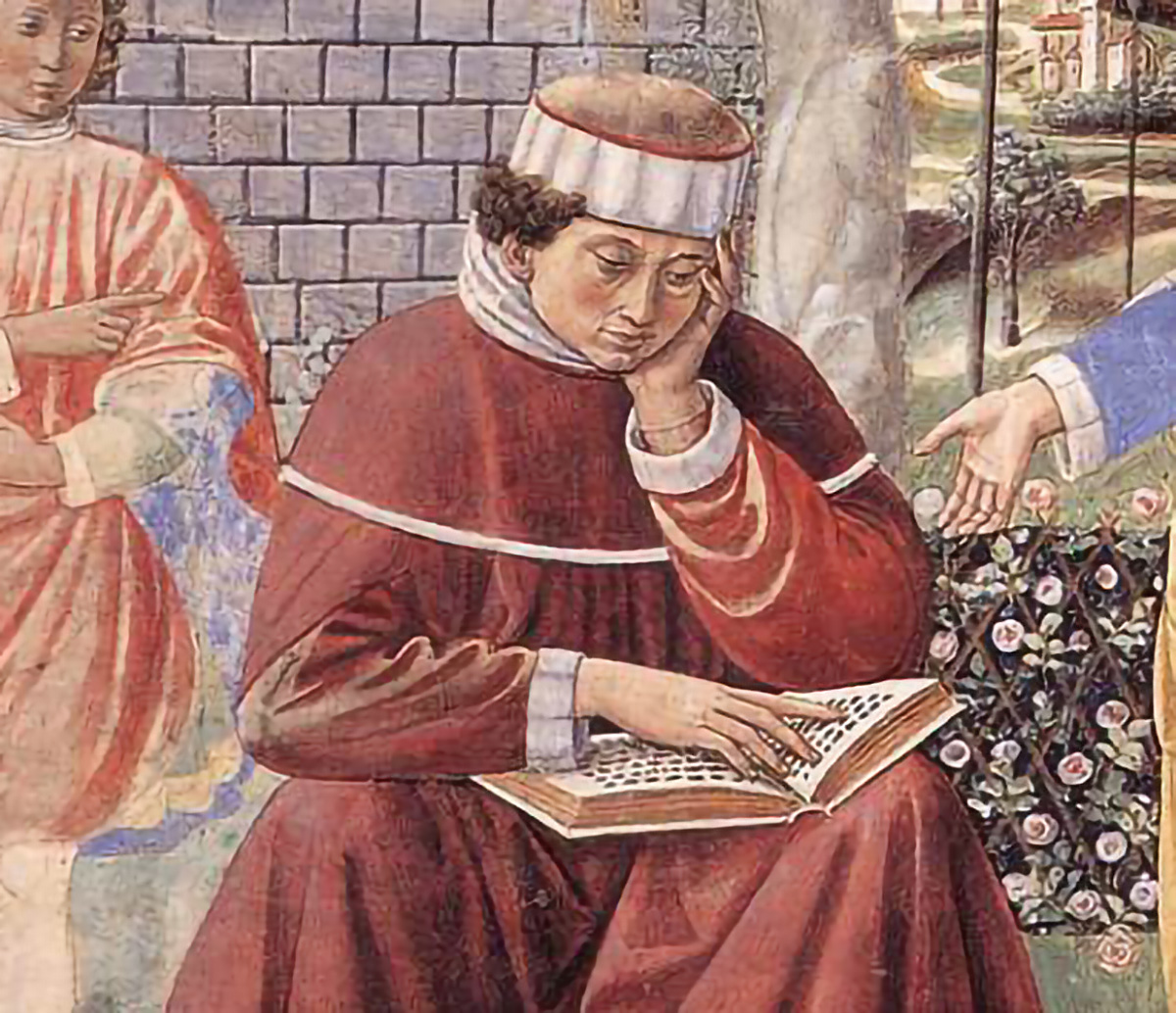In Truth and Method, German philosopher Hans-Georg Gadamer introduces a theory of horizons to explain the way translation mediates distance in time. The author writes his work from a given moment in time; he sees the world a certain way. He publishes his book, and if he writes well his work survives and moves forward in time. The reader encounters that work from a far later moment in time. The distance that meaning must travel, Gadamer argues, is why the great books require constant retranslation. The measure of a new translation, if Gadamer is right, lies in the translator’s ability to mediate the distance between horizons of past and present. Anthony Esolen’s new translation of St. Augustine’s Confessions accomplishes the task. Esolen’s facility with language is such that reading his translation moved this reviewer from meditation to worship.
A new translation of Augustine’s spiritual biography makes the ancient new again and reveals why it has aged so well.

By Saint Augustine of Hippo
Translated by Anthony Esolen
(TAN Books, 2023)
Augustine’s Confessions is timeless: his movement to Christianity through initial intellectual curiosity, conviction of sin, love of his own sin, and final encounter with the living God hits the reader with a sense of historical continuity. His story reminds the reader that the struggles of the 21st century—religious, sexual, and philosophical confusion—are nothing new. These have been part of the Christian experience from the earliest days. The Confessions tells the story of one man’s journey to faith, but in doing so speaks beyond the author’s moment in time to ours. In that movement from past to present, transcending a particular culture, the Confessions rises to greatness.
Within the book’s pages, Augustine takes up ideas of philosophical theology: mind, space, time, good, evil, matter, hermeneutics. So many modern problems are addressed: Does the text have one meaning or many? What is the relationship between time and space? How does one define evil? Why does it exist in this world? Does it, in fact, exist? For Augustine, coming to faith meant learning that Christianity answers these questions. And yet, intellectual profundity alone remained insufficient; Augustine’s life changed as he wrestled with sin, recognizing his inability to defeat it and need to submit to God through the Word.
Augustine’s consciousness of sin permeates the Confessions: “And now behold, let my heart tell you what it was seeking, that I should be so free with my evil, that there should be no cause of my malice but the malice itself. It was foul, and I loved it; I loved to go down to the lost, I loved my failing, not the thing for which I was at fault, but the failing itself.” Augustine’s honest self-evaluation takes the reader into his evil heart and his love of wrongdoing while always balancing such a view with his need to love the good.
In addition to a theological journey, the Confessions also functions as a window into what historian Peter Brown termed “Late Antiquity,” roughly the third through fifth centuries AD. Augustine’s world was a single civilization stretching across the Mediterranean. It was an intellectually diverse world: the Manicheans, the Platonists, and the Christians all contended that their explanations of reality were absolutely correct, with varying degrees of exclusivity found in each claim. Julian the Apostate had attempted to bring back paganism but failed; Christianity was on the rise but not yet ubiquitous. In Augustine’s youth, Rome seemed unshakable. By his later years, the Roman world showed signs of imminent collapse. During such a time, Augustine grew to intellectual maturity. The Confessions does not show him primarily as an aged bishop writing something on the order of The City of God; rather, reading the Confessions is to encounter Augustine as a bright young man with a passion for two subjects: philosophy and women.
Augustine’sstory reminds the reader that the struggles of the 21st century—religious, sexual, and philosophical confusion—are nothing new.
His philosophical inclinations set up a need for intellectual answers: the dualistic theory of Manichaeism, with its endless struggle between light and dark, was at first enticing, then rejected. Augustine broke with Manichaeism when a famous teacher, Faustus, failed to answer his questions: “I put to him the questions that moved me, and I discovered right away that the man was not skilled in liberal learning, except for grammar, and that in the usual way.” Plato’s theory of ideas and dialectic became formative and set the bar high for a Christian preacher to meet Augustine’s expectations of intellectual complexity. Ambrose of Milan satisfied Augustine’s need for that complexity; he demonstrated the importance of religious leaders’ ability to speak well and to answer difficult questions. Ambrose’s articulation of the Trinity solved Augustine’s philosophical need for truth. He knew there could be only one God; Plato had convinced him of that. Now he could see that Christians did not, in fact, worship three gods. Christianity could grapple with the highest truths, and this mattered for Augustine.
Augustine’s sexual passions are catalogued throughout the Confessions. The pornification of late modernity is rightly of much concern, but Augustine reminds contemporary readers that the ancient world was also highly sexualized. While the contemporary teenager has much to struggle with (porn addiction enabled by smartphone technology, for example), Augustine lived in a world of publicly approved and inexpensive public prostitution. He writes, “And what was it that delighted me, but to love and be loved … so that I could not tell the difference between the clear skies of genuine love and the fog of lust.” His descriptions of being a 16-year-old, “when the delirium of licentious craving had gotten the scepter over me, and I gave myself up to it utterly,” underscore this reality. These descriptions offer instances where Esolen’s attention to poetic imagery is especially helpful; lust as a “fog” contrasted with the “clear skies” of “genuine love” are beautiful metaphors that crystallize the feeling of lusty teenage years without elevating that feeling as something good. The image of lust having “the scepter over” Augustine conveys a clear sense of lust as a slave master that does not have Augustine’s good in mind.
Augustine settled down with an unnamed concubine, eventually conceiving a child with her (his son, Adeodatus). Lust became his besetting sin: “I was not yet in love, yet I loved to be in love.” As Augustine grappled with the growing intellectual agreement with Christian teaching, he resisted conversion because he knew God demanded not just his intellectual assent but also obedience to a sexual code of ethics. He writes that “I loved the blessed life, and I was afraid to find it in its proper place, and so I fled from it even while I sought it. I thought I would be the most miserable of men if I were deprived of a woman’s arms.” The Confessions reminds the Church that remaining consistent in teaching a biblical sexuality and the joy found in right alignment with God’s revealed will is itself a testimony to the grace of the living God. Our moment requires teaching the reality of sin; so too did Augustine’s.

Augustine was one of the first Christian thinkers to consider the problem of evil and to develop a clear answer. His articulation was not the modern one; a modern religious skeptic may well ask, “If God is all-powerful, why is there evil in the world?” Augustine’s question was more basic: What, precisely, is evil? Is it a substance? If so, why would God make it? Across several books, Augustine develops a complex answer: God is the source of all being, and as such is good. Evil is not a substance but rather a failure to be one. Evil is a distance from God.
It follows that whatever exists is good. Then evil, whose source I was always searching for, is not a substantial thing, because if it were, it would be good. For a substantial being is either incorruptible, a great good indeed, or it is corruptible, in which case it must be good, because otherwise there would be nothing to corrupt. Thus did I see, and it was manifestly clear, that you made all things good, nor are there any substantial beings that you have not made. And because you did not make all things equal, it follows that each individual thing is good, and that all things taken together are very good, because our God made all things very good indeed.
Evil, Augustine argues, is not; evil is a failure to be what one truly is. Augustine’s Confessions looks forward to Heidegger’s Being and Time. Though Heidegger and Augustine developed different answers, they asked the same essential question: What does it mean to be? For Augustine, it means to receive being from God himself, in whom we “live and move and have our being.” A failure to do so diminishes us; such diminishment Augustine calls evil.
In addition to deep meditation on the nature of evil, Augustine dedicates a book to the nature of the mind itself. He predates Descartes and Hume by over a thousand years, exploring the relationship between the external world perceived by the senses and the infinite complexity of the mind that perceives it. Esolen explains in a note that this portion of book 10 is “a remarkable meditation upon, and analysis of, the human mind; I know of none more acute and incisive, either from the ancient world or from our own time.” In this meditation, Augustine develops a robust vision of memory, concluding that “great is the power of memory, this thing that makes us tremble, my God, a boundless multiplicity, profound as the sea. And this is my mind, and I am it.” The mind is of potentially indefinite extension, able to comprehend the potentially infinite memory housing the individual’s experience.
Esolen’s translation helps the reader engage with Augustine’s thought in a way previous translations do not.
So finally, in what way does Esolen succeed as translator where others perhaps failed? The freshness of Esolen’s translation helps the reader engage with Augustine’s thought in a way previous translations do not. For example, here are the opening two sentences from book 1 in Edward Bouverie Pusey’s popular 19th-century edition: “Great art Thou, O Lord, and greatly to be praised; great is thy power, and thy wisdom infinite. And Thee would man praise; man, but a particle of thy creation; man that bears about him his mortality, the witness of his sin, the witness, that ‘Thou resisteth the proud’; yet would man praise thee; he but a particle of Thy creation.” The archaic language initially throws off the contemporary reader, as does the sentence order locating the predicate first followed by the subject. Consider also Maria Boulding’s 2002 translation, which offers the same passage but in updated language: “Great are you, O Lord, and exceedingly worthy of praise; your power is immense, and your wisdom beyond reckoning. And so we humans, who are a due part of your creation, long to praise you—we who carry our mortality about with us, carry the evidence of our sin and with it the proof that you thwart the proud. Yet these humans, due part of your creation as they are, still do long to praise you.” “Thee” and “thou” have been replaced with “you,” “man” has been swapped for the more universal “human,” and Pusey’s complex sentence has been broken into two shorter sentences.
Now Esolen: “You are great, O Lord, and to be praised indeed; great is your power, and your wisdom is beyond reckoning. And man, a mere part of your creation, desires to praise you, man, who bears his mortality with him, and the testimony of his sin, and testimony that you resist the proud; and still this man, this part of your creation, longs to praise you.” Esolen puts the sentence order in typical English pattern, with subject leading to predicate, but restores the complex sentence. His use of punctuation to link the ideas builds pictures of God’s greatness, man’s smallness, and man’s longing to worship. Esolen’s poetic ear and eye for fidelity to Augustine’s theological imagination resonate throughout his translation, helping the modern reader enter imaginatively into Augustine’s theological journey.
Augustine’s life reminds the reader that the story of salvation is both unique for each person and universal. Everyone comes to faith in a unique set of circumstances and applies the teachings of the gospel in a specific context. And yet for each Christian there is the mix of intellectual cognition of the faith, recognition of sin as a ravaging force that cannot be overcome by willpower, the need to submit to divine command as the only hope of happiness—all combined with some sense of real divine encounter. Augustine highlights the continuity of the Christian experience: while bringing the reader into his unique moment in time, he reveals the universality of the gospel. Anthony Esolen brings Augustine’s voice into the 21st century and helps the Church of today enter imaginatively into Augustine’s spirit of worship as he perceived the complexity of God.




